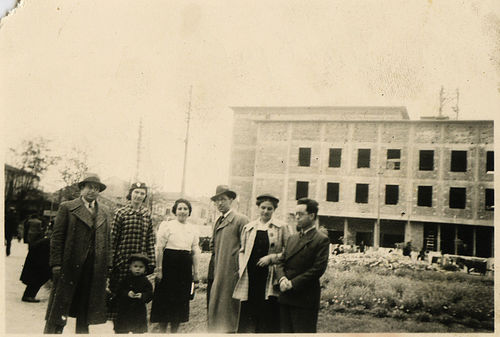Here is an outdoor game for all the family. After singing lustily at the Sunday service, and having a little chat with the vicar on the church steps, you should repair to a patch of waste ground, taking with you a couple of battered iron pails, an unopened packet of processed cheese triangles, and some strips of bark from a pugton tree. Each family member should don a red balaclava, apart from the tiniest one, who goes bare-headed. One side of the patch of waste ground is designated Nobby Stiles. The opposite side is consecrated to David Blunkett. The object of the game is to get from Stiles to Blunkett as directly as possible, cleanly and without undue dithering. If the patch of waste ground is assailed by inclement weather, for instance a howling gale, a teeming downpour, or thunder and lightning, the family may be accompanied by beetle-browed urchins from beyond the railway tracks. Use counters and a tally stick to keep score.
Monthly Archives: February 2007
Succour For Convulsive Infants
Today is the feast day of St Scholastica, the patron saint of convulsive children. This is good news for Pang Hill Orphanage, where the tinies are often convulsed by wild enthusiasms for exciting games such as Pin The Paper To The Hardboard and Put The Detritus In The Waste Basket. St Scholastica can also be invoked against rainstorms, so her feast day is doubly welcome, as Pang Hill is almost invariably lashed by ferocious teeming rain no matter what the weather is like elsewhere.
This morning the orphans will have gathered in the big pantry behind the canteen to sing their special song:
O Scholastica please stop the rains / So we can concentrate our fuming brains /
On playing Watch The Orphans Faint / O Scholastica our patron saint!
New Nozzles For Nobody
Nobody got new nozzles on No New Nozzles Day. It was ever thus, even in ages past, long long ago, when the Hobgoblin Princeling ruled all the lands as far as a chaffinch can fly from dawn to dusk, when the chaffinch is gravid.
The Parish Wolf
Last week we held a funeral service for the parish wolf, although none of us is sure if it is really dead. Its howling has not been heard for twelve years, though, and under our laws a death certificate can be issued for a missing wolf after just five years. The general feeling in the parish was summed up by the sexton in a notice nailed, Luther fashion, to the door of the church. Even in the absence of a corpse, it would be for the good of the parish if obsequies were held. This was the gist of his notice, though it was couched in the mighty prose he deployed even when writing nature notes for the parish newsletter, and he did not on any account use the word closure.
One reason the sexton is so persuasive is that his appearance and bearing are strongly reminiscent of the actor James Robertson Justice (1907-1975). This is no accident. Over the years, the sexton has worked hard to imitate that booming voice, and he has undergone cosmetic surgery the better to ape the appearance of the man who, when not appearing in films, kept busy as a naturalist, racing driver, and falconry expert.
Before dawn on the morning of the funeral there was a teeming downpour. The rain had ceased by the time we gathered in the churchyard, but the pugton trees were drenched, water droplets dripping from the tiny grey spongy buds, each bud like the brain of a homunculus. An extraordinary number of puddles had formed on the paths, and there are many paths converging on St Bibblydibdib’s, for it is the only church for miles around, all others having been smashed to ruination by the sexton’s predecessor, single-handedly. He was twice the size of the present incumbent, a titan among sextons, and a brute, and the parish has been much quieter since he wilted away and was carted off to a mercy home. No ducks plashed in the puddles, for word had not yet reached them that the parish wolf was dead, or at least thought to be dead, and no duck dared come near for fear of being torn to bits.
Films About Bees
One of the most eagerly-anticipated awards in the arts calendar is Hooting Yard’s Best Title Of A Film About Bees Made Within The Last Five Years. We only make this award after a rigorous selection process, fuelled by many, many cups of piping hot tea in Mrs Gubbins’ space-age kitchenette parlour.
I am delighted to announce that the 2007 Award goes to William Bishop-Stephens for Bee Control In City Parks. He wins a toffee apple with bite marks which, a dentist tells me, could well have been made by fictional athlete Bobnit Tivol immediately after he won the 1966 Blister Lane Bypass Sprint Hurdles Cup And Saucer in a then record time of eight hours, sixteen minutes and forty-four seconds.
Well done, Will, and I am sure all Hooting Yard readers will take the opportunity to watch your splendid film.
The Post Office In Plovdiv
Here is a 1930s photograph of the post office in Plovdiv. See the Comments for The Socks Of Pepintude to gain a deeper understanding.
Chump And Flapper
“Either way,†said the flapper, “Hand me that oar. It is time we rowed home, for look!, the sun is setting, and if we do not row home we will be plunged into darkness out here in the middle of the vast, vast lake. Such a prospect gives me the collywobbles.â€
“I think it would be a good idea for you to essay a tad of chumpery to distract the thugs,†said the flapper to the chump.
“I mean what I say,†snapped the flapper, “And be quick about it, or we will be bashed by brutes!â€
Thus, on a moonlit jetty, ended the criminal careers of the chump and the flapper. Cargpan placed them in manacles and bundled them into the boot of his car, before driving off at inhuman speed up into the hills, leaving the thugs to smash the rowing boat, and the rowing boat’s oars, to smithereens.
Pick Some Words & Save Resonance
The world’s finest radio station, Resonance104.4FM, is in urgent need of funding. You can help the station remain on air by sponsoring next week’s Hooting Yard On The Air show, to be broadcast (live as ever) at 4.00 PM on Wednesday 14 February. Here is how it works:
1. Go to Resonance and donate a minimum of £5.
2. You may now choose a sentence, a phrase, a string of words, or a name to be incorporated into a specially-written story which will feature on next week’s show.
3. Send your chosen words to me at hooting.yard@googlemail.com, and voila!, it’s as simple as that.
4. After reading the story, I will recite the names of the donors (unless anonymity is preferred).
5. Now follow Step 1, immediately!
Good King Wenceslas Impersonation Incident
“Hearken ye, stooped mendicant at my gate! I am Good King Wenceslas, and I am looking out, and I can see you, poor and shivering in your rags, for the snow is deep and crisp and even. There are not even any tracks in the frozen white expanse, such as would be made by wolves or bears. Wait there at my gate, O wretch, and shortly I shall descend from my castle ramparts and join you in the snow!â€
And he grabbed hold of the Natterjack Man’s ragged sleeve and propelled him towards the nearest athletics stadium, twenty miles distant, and put him through his paces. It is a curious fact that only upon his deathbed, thirty years later, the winner of no fewer than sixteen pole-vaulting gold medals, famed beyond common sense throughout Tantarabim and Pointy Town and all points westward, learned for the first time that his benefactor was not, nor ever had been, Good King Wenceslas, but was none other than the irascible and chain smoking Old Halob. The surprise felled him, or would have felled him had he not already been lying on his back, close to death, muffled by bandages, in the bedroom of his converted hovel in the shadows of the castle upon which snow had fallen, in which crows and bats and badgers had swooped and scuffled, where a tin crown and a pair of galoshes could still be found, high on the highest shelf in the highest chamber, higher than even the Natterjack Man had ever vaulted in his prime.
Concrete Boats
I was reading Electric Universe by David Bodanis, and was struck by his comment that Thomas Alva Edison spent an inordinate amount of his time working on plans for a concrete boat. It pleases me to learn that J L Lambot got there before him, in 1848. See A Short History Of Concrete.
The Socks Of Pepintude
Today I am wearing the Socks of Pepintude, and so attired I shall stride forth decisively. There is of course a risk that curs will snuffle at my socks, and kittens too, possibly, for the Socks of Pepintude emit odours which convulsively befuddle our four-footed friends, though they remain undetectable by the human nose. Or so I have been told by my spy at the lab, who keeps me up to date on such matters. It is best to wear a pair of tough Uruguayan Air Force boots over the Socks of Pepintude. This will go some way to deter curs, and kittens, and thus one’s decisive progress through the boulevards meets with less travail.
You may ask where I am going, so decisively, through the boulevards of this important town. I am going to the post office. Alas, unlike the post office in Plovdiv it is not emblazoned with a mural painted by the Plovdiv Fivesome, but none the less it is a very fine post office. Outside it on the esplanade is a flagpole with a big blue flag flying atop it. The doors are made of some weird iridescent metal and swoosh open as one approaches. Having thrown off any trailing curs and kittens I am going to cause those doors to swoosh and I shall make my decisive strides into the post office lobby, where a cadet in a cadet’s cap and tunic will point me towards a queue leading to a counter behind which I know in the innermost fibres of my being there will be a tally-stick person ready to sell me some postage-related items.
When the exchange has been made, I will exit again through the swooshing doors, having saluted the cadet, and I shall stride decisively into the esplanade, and gaze at the flag atop the flagpole, and I shall not flinch.
Source : Forty Visits To The Post Office by Dobson (out of print)
Presidential Pastimes
One of the greatest pleasures in the life of Richard Milhous Nixon was the act of mashing potatoes.
Source : Nixon’s Shadow by David Greenberg
Hoots Of Destiny
Hooting Yard crashes in to 2007 a month late and with a new format. The old pages – which of course you can still visit – had a certain ramshackle charm, but I’ve decided to use this standard blog format for a number of reasons. Better indexing, for one thing, and we all need indexes. Also I hope that readers will take full advantage of the Comments feature and spout their own twaddle to complement my own. Onwards and upwards! Here, for your delectation, is a picture sent to me by that scalliwag Max Décharné.






